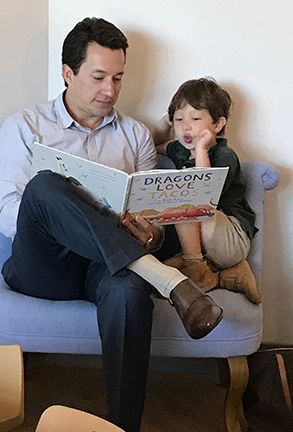

The Gift of Reading
Source/Author: Mike Murphy, Headmaster
August 23, 2019
Books are our friends. If there is any advice an educator can give to a family beyond providing all children with love, it is to read to them and with them on a daily basis. Reading is power. Reading is fun. Whether one is a one year old or 101, the benefits of reading on brain development is undisputed. Reading makes us healthier people. Reading also allows one to take full advantage of school and independent learning.
Parents, guardians, siblings and friends have regular opportunities to teach all children to love how words have meaning. Illustrations in picture books can help spark imaginations. The repetition found in books for early readers helps young children realize that they can predict what is going to happen. It allows them to tell a story and it enables them to realize that they can learn to read. They can do the things that the older people in their lives can do.
While people might argue whether the use of memorization, sight words, and/or phonetic spelling is the most effective way to teach and inspire reading, I advocate for all three methods and believe that making reading a part of the life of a young person is every bit as important as the method used. I do not worry about the child who is not reading at five or six or even seven. As long as the child has a love and fascination for the stories, as long as the child will share/dictate stories to another who can put them on paper, as long as the child wants to express ideas in writing, I am confident independent reading and writing will occur and the child will thrive.
I am more concerned that a delayed reader may be taught to believe there is a lack of ability, which is very different from a lack of readiness.
There is plenty of research about learning difficulties some children/people experience because they were pushed into activities before they were ready. Throughout my career I have seen dedicated and experienced teachers plead with parents not to push their 5-year-old and younger children into phonics programs that the child’s brain was just not ready to absorb.
Because memorization is a relatively easy process for the brain, some children can appear to be making progress when in fact they are just disguising a developmental delay. The bottom line is that as long as we keep children interested and confident, they will learn when their body clocks are ready. Yes, great teachers can have a significant impact on learning levels. Yet, those experienced teachers know that readiness, not intelligence, is a key element in early reading and writing.
Making books the friends for a child is a gift that will last a lifetime. The advantages of early speech and language development are critical for success in our schools. Whether we use our public libraries, our school libraries or our personal collections, the exposure to books is critical to child development. If you have not read a children’s book in recent years because your child has outgrown picture books, do yourself a favor and read one. If your child is hooked on a series, try reading at least one book in the series and allow your child to guide you along on the adventures that are filling their imagination. Model reading. You and your children will benefit.
Cheers!
Mike
























